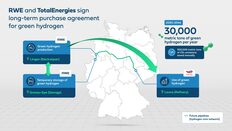- TotalEnergies will purchase 30,000 metric tons of green hydrogen annually from 2030.
- RWE's 300-megawatt electrolysis plant in Lingen will start operations by 2027.
- The hydrogen network will connect production sites and industrial centers by 2032.
- Green hydrogen aims to cut CO2 emissions by 300,000 metric tons annually.

Agreement Overview
TotalEnergies and RWE have signed a 15-year agreement for the supply of green hydrogen, marking a significant step in the hydrogen market. Starting in 2030, TotalEnergies will purchase 30,000 metric tons of green hydrogen annually for its Leuna refinery in Germany. This is the largest contract for climate-neutral hydrogen from an electrolyser in Germany.
Environmental Impact
The use of 30,000 metric tons of green hydrogen is expected to save 300,000 metric tons of CO2 emissions per year, equivalent to the emissions of 140,000 cars. This initiative aligns with Germany's goal to reduce greenhouse gas emissions from fuel suppliers by 25% by 2030.
Infrastructure and Production
The hydrogen will be produced at RWE's 300-megawatt electrolysis plant in Lingen, set to begin operations by 2027. The plant will use electricity from renewable sources, complying with EU regulations that require electrolysers to operate with renewable electricity generated in the same hour as the hydrogen production.
Hydrogen Network
The supply chain will be supported by Germany's hydrogen core network, which will connect production sites like Lingen with industrial centers such as Leuna. The network, spanning over 9,000 kilometers, will be phased into operation between 2025 and 2032, utilizing both repurposed gas pipelines and new constructions.
Storage Solutions
To ensure a reliable supply, RWE Generation will use hydrogen storage facilities in Gronau-Epe, scheduled to be operational by 2027. This storage solution will help maintain supply during periods of low renewable energy generation.

